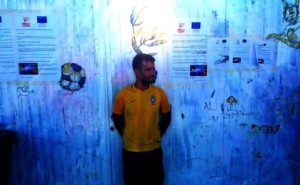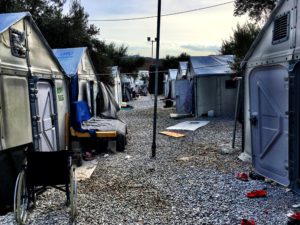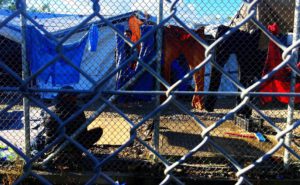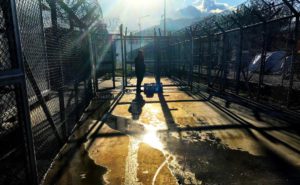Category Archives: Documentos
(Français) Jean-Pierre (Québec): Ma session des nouveaux arrivés
(Français) Nouvelles de la Famille Spirituelle Charles de FOUCAULD – 1/2017
(Français) CHARLES DE FOUCAULD – ET LA PRATIQUE DES OEUVRES DE MISERICORDE
(Español) Semblanza del hermanito Juan
THE ISLAND OF LESBOS, A REFUGE OF HOPE. Carlos LLANO
Carlos LLANO is a sportsman, economist, founder of the NGO Childhood Smile and a volunteer and co-worker with the Foundation Tienda Asilo de San Pedro of Cartagena,  Spain, in the WEND BE NE DO project in Burkina Faso. He recently went as a volunteer to the island of Lesbos, in Greece, to work with refugees. We offer his valuable testimony. Thanks, Carlos.
Spain, in the WEND BE NE DO project in Burkina Faso. He recently went as a volunteer to the island of Lesbos, in Greece, to work with refugees. We offer his valuable testimony. Thanks, Carlos.
We live at such a pace and so attached to our mundane first world needs that if we could to stand back and take a good look at ourselves, we would feel ourselves revolted. The world has serious problems to solve: it is estimated that there are 300,000 child soldiers and that already in 2016 some 5,000 refugees or migrants have drowned in the Mediterranean, but generally we are more concerned about our petty first world problems than that which may be happening beyond our borders, terrible and all as these events are.
We see them so distant that, since we think we can do so little, we end up doing nothing. The problems of the world are not solved by accepting them with resignation or indifference or by blaming governments. The world’s problems are mine, they’re yours, they are ours. The world changes affected and inspired by our day to day behaviour. If I  don’t want to see any more drownings, I must make the firm decision to go and do my tiny bit, that no matter how small it is, it is gigantic compared to inaction or the hundreds of messages that we can post on our social websites.
don’t want to see any more drownings, I must make the firm decision to go and do my tiny bit, that no matter how small it is, it is gigantic compared to inaction or the hundreds of messages that we can post on our social websites.
Lesbos is a small Greek island in the middle of the Aegean Sea very close to the Turkish coast. There are two refugee camps there: Karatepe, which still retains a certain dignity, where there are entire families, mainly of Syrians, but which could even have families from the Dominican Republic. Yes, I repeat, from the Dominican Republic. When you have nothing, you will even risk your life, because you have nothing to lose besides it, and desperation can reach such a level that even life becomes worthless.
In Karatepe each family has its own UNHCR tent, they have blankets, mattresses and the REMAR volunteers assume the task of bringing them two meals daily delivered to the very door. The children play in the tent ‘estate’, and with hope for a better life it seems that not all is lost.
 The other refugee camp is Moria. An old prison with capacity for 2,000 people where more than 5,000 are crammed into large field tents which float when it rains and the mud slides down the embankment. The tension is patent and one’s only desire is to get through those high fences full of barbs. Here there are no families, there are lots of young men and some women with young children. Each one with their own nationality, customs, language and culture. Nigerian youths who are fleeing because Boko Haram kills, kidnaps and tortures whoever they wish. Pakistani teenagers who no longer wish to live in a country where Isis comes to a village to slit the throats of all the women and shoot all the men until the village is left without a trace of life. These are true stories that they have recounted to me while I helped for hours carrying out the banality of cutting kilos and kilos of potatoes to allow those thousands of youths, women and children to eat united in desperation seeing no light at the end of the tunnel, seeing that the authorities keep them there forgotten and with the passage of time we remember them less and less in our thoughts. The
The other refugee camp is Moria. An old prison with capacity for 2,000 people where more than 5,000 are crammed into large field tents which float when it rains and the mud slides down the embankment. The tension is patent and one’s only desire is to get through those high fences full of barbs. Here there are no families, there are lots of young men and some women with young children. Each one with their own nationality, customs, language and culture. Nigerian youths who are fleeing because Boko Haram kills, kidnaps and tortures whoever they wish. Pakistani teenagers who no longer wish to live in a country where Isis comes to a village to slit the throats of all the women and shoot all the men until the village is left without a trace of life. These are true stories that they have recounted to me while I helped for hours carrying out the banality of cutting kilos and kilos of potatoes to allow those thousands of youths, women and children to eat united in desperation seeing no light at the end of the tunnel, seeing that the authorities keep them there forgotten and with the passage of time we remember them less and less in our thoughts. The  dehumanization is such that criminal gangs have turned the problem into a profitable business where they charge between 3,000 and 5,000 euros per person for a boat journey without any security, overweight as a result of cramming more and more people without even room to move, where no individual is allowed carry any luggage, as it would take up space that another refugee could pay for, and with a few lifejackets filled with rubbish rather than air, which in case of need and for its lack of buoyancy, will cost another life, adding to the number of 5,000 people who have already drowned in the Mediterranean in 2016. Our disquiet or our indifference remain in the face of this human disaster that seems to be a total impasse. To change the world is in our hands.
dehumanization is such that criminal gangs have turned the problem into a profitable business where they charge between 3,000 and 5,000 euros per person for a boat journey without any security, overweight as a result of cramming more and more people without even room to move, where no individual is allowed carry any luggage, as it would take up space that another refugee could pay for, and with a few lifejackets filled with rubbish rather than air, which in case of need and for its lack of buoyancy, will cost another life, adding to the number of 5,000 people who have already drowned in the Mediterranean in 2016. Our disquiet or our indifference remain in the face of this human disaster that seems to be a total impasse. To change the world is in our hands.



